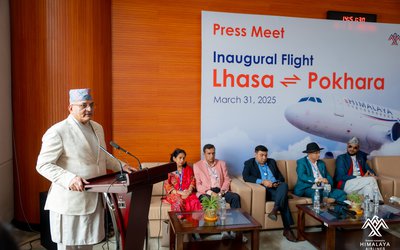
By Bhuvanesh Khanna
BINOD CHAUDHARY is among the most astute men in the world. He controls CG Group, a multi-national empire with presence in several countries, from India to Central Asia, and in multiple segments – financial services and energy to real estate, education, biotech, consumer electronics food (Wai Wai noodles has factories in India, Serbia and Bangladesh, with one under construction in Egypt) and, of course, hospitality. Incidentally, it is the only MNC to be headquartered in the picturesque Himalayan nation. Forbes, which included Chaudhary in its World’s Billionaire list last year, valued his real-time net worth to be at $1.7 billion.
Among the hospitality industry insiders, CG Hospitality is a significant name. Sixty of the group’s 94 operating hotels are in India. Overall, 4,654 keys are spread over 65 destinations, nine countries, while another 36 hotels in over 22 destinations are in the pipeline. In India, CG Group has intimate bonds with IHCL; they have invested in several Taj Safari properties in India, and their newest investment as a significant stakeholder is Taj Jumeirah Lake Towers, Dubai.

Hospitality has become a cornerstone for the group, which has added almost 15 hotels yearly. “We will reach our target of 100 hotels under management under our brands by 2020,” says Chaudhary, 62. “We are on track with our expansion plans. This will make us the second largest management company in India after IHCL (The Indian Hotels Company Limited). It will take our global presence to about 150+ hotels, pushing us closer to our target of 200 hotels across the world by 2022.” The company also develops strategies to help hoteliers and entrepreneurs increase the value of their investments.
Chaudhary’s rise to success is a fascinating journey of great ideas and an innate ability to spot opportunities. Tracing his familial roots to Marwar, he imbibed the business acumen the community is often credited with, at a young age, when he joined his family’s retail store after his father fell ill. However, the young Chaudhary was also passionate about travel, music and Bollywood movies and started a discothèque company called Copper Floor, which saw considerable success and put him in touch with many influential people.
Pierre Lamunière, writing for HongKong Tattler, remembers the time he traveled from Switzerland to Nepal in a second-hand Volkswagen van, and the man he could have met while on a sojourn through the Himalayan country. “Walking through Nepal’s capital by night, we could easily have encountered the fashionable, 20-year-old, long-haired man who had just opened Copper Floor, a nightclub frequented by tourists and locals alike. That young man was Binod Chaudhary and he would go on to form Nepal’s largest multinational company, becoming the first and only Nepalese on Forbes’ World’s Billionaires List.”
Chaudhary was only 19 at that time and the business resulted in friction at home. He has said in interviews, “Often at night, I would sneak in after work only to find my dad sitting on my bed, angry.” The disco shut down in 1978, three years after he got involved, but he learned a few things from that experience: You meet all kinds of people in a club—decent men, women, and criminals. Thanks to Copper Floor, he learned to differentiate early. Doing something considered taboo, attract the ‘rebel’ label, which helps when you want to experiment and expand your business.
The genesis of Wai Wai was also experimentation: by the mid-1980s, to support their biscuit business, Chaudhary and his father had built a big flour mill. Soon they discovered that they produced more flour than could be consumed. That was the genesis of Wai Wai. Known to be tenacious in his pursuit of success, Chaudhary has never looked back and today, he along with his three sons, Nirvana, Rahul and Varun, run a vast business empire.
The third-generation ‘Nepali’ (his grandfather was from Churi-Ajitgarh village in Shekhawati district, Rajasthan, and moved to set up a textile import business in Nepal about 130 years ago) he has often likened his ancestor’s will to succeed to that of the Jews. “Rajasthani businessmen like my grandfather knew they had to achieve something when they set out to new countries because there was nothing waiting for them in their land," he is quoted to have said.
CG’s foray into hospitality
In his autobiography, Making It Big, he remembers gazing longingly at the Taj Mahal Palace hotel in Mumbai as a young boy and being dissuaded from entering the hotel by his relative. Today, he owns several Taj hotels, and his partnership with the brand has grown manifold. Chaudhary’s foray into hotels began when he took over 50 percent of the Taj Samudra in Colombo, in order to bail the hotel out of serious financial difficulties. Since then, he has partnered with the parent company of Taj Hotels, IHCL on a number of hotels. “We are proud of our relationship with IHCL,” says Chaudhary. “We continue to explore new opportunities to strengthen our partnership in the future. However, in India, as of now, we are only invested with IHCL in the safari lodges.”

He considers India a very difficult market when it comes to investments and approvals. “We have faced the same during our initial years in India; by the time we got the approvals to start our project, the whole market dynamics had changed. That compelled us to change our strategy to look at asset-light deals. We are happy with this approach in India.”
Chaudhary says the group’s vision is to build CG Hospitality as a strong management company with a portfolio of renowned brands across the globe. “Our target is to add 200 hotels by 2022 in our portfolio. We aspire to make CG Hospitality a USD 1 billion company in the next five years. It is unique because it believes in long-term strategic investment and has a strong history of investing in the hospitality sector. Further, having its own hospitality management company has equipped CG in bringing the best hotel practices on board. We have been operating hotels for more than 17 years through its unique business model and commitment to values.”

The group has a JV in place with &Beyond and with Sri Lankan hotel brand Jetwings. It notably acquired Radisson JFK Airport in 2006 and has expanded its footprint with Taj Asia Limited. Another area that Chaudhary desires to spur on is tourism between Nepal and India. “Reciprocating the cultural dimensions of the two countries and aligning it with spirituality based on eastern philosophies and ancient knowledge, tradition and culture of two countries could make a good package for international tourists,” he says. “If one is able to come to see the birthplace of Buddha and want to have a full circle on Buddha’s life, then one must travel to destinations such as Gaya and Bodhinagar, where Buddha was enlightened and later left this world through the path of Nirvana, both of which are in India. This would be an amazing experience and storytelling for people to realize how the two countries are connected. The example of Janakpur and its significance in the story of Ramayana reveals how tourism in the two countries can be promoted together in one package.”
CG GROUP: THE BRANDS
CG Hotels now operates and manages a full suite of hotel and resort brands including standard to deluxe hotels, apartment hotels, boutique hotels, and time-share properties.
The Zinc boutique full-service accommodations are known for their acclaimed high-end interiors. As a lifestyle brand, it strives to stimulate a diverse and innovative environment, enhanced by a sense of belonging and style with a splash of local culture.
The group’s flagship brand is The Fern or environmentally-conscious hotels certified by an external third party, Ecotel, the hallmark of environmentally-sensitive hospitality.
Zinc Journeys represent the group’s boutique collection of lifestyle getaways. Each one comes with its own tailored set of experiences.
Combining the latest science – and evidence-based natural and integrated medical therapies from East and West, The FARM is a true healing sanctuary with its five pillars: Diagnose, Cleanse, Nourish, Repair and Sustain.
The Fern Residency is a mid-tiered experience of hotels and resorts in the 3-and-4-star categories.
Beacon provides smart and efficient hotels with an emphasis on quality and value. Beacon hotels have a presence in Tier 1 and 2 cities and are predominantly present in smaller cities.
Zinc Living encompasses spacious apartments, an ideal space for those who never want to leave the comfort of home.
Connecting with the spirit
CG Group’s leanings towards everything spiritual has also found expression in Shashwat Dham, a grand temple and center for Vedic learning in Kathmandu. “Spirituality is embedded within human evolution,” says Chaudhary. “Everywhere we go, every culture and religion has a higher sense of spiritual energy which guides us to become better human beings, protect Mother Nature, and dedicate our lives in service of others. In my opinion, temples, monasteries, mosques, churches or any other physical infrastructure of spiritual values absorb positive energy. We feel free and tranquil in such spaces because of combined positive powers. I truly believe in the science of spiritual energy. Shashwat Dham holds our religious values, cultural values, spiritual values and philanthropic values. It is also the centre of our national identity where it showcases the values of two religions —Hinduism and Buddhism — harmoniously flourishing within our ancient civilization in such an unprecedented way.”
Rewinding to how the idea of Shashwat Dham evolved, he enumerates that they were guided and blessed by the late Shankaracharya to establish a temple and a Gurukul where young pundits could receive authentic education based on Vedic sciences. “The late Shankaracharya often rued about the lack of proper education and pure pundits who abided by the Gurukul education system for executing proper karma kanda in Hindu rituals. It motivated us; we had a responsibility to make a change. Thus, the Ekambareshwar Shiva temple was established along with the Gurukul within Shashwat Dham, in 2016. We established a Buddhist Chaitya in 2017. The uniqueness of our religious harmony and civilization based on these two religions are inseparable, and we are privileged to be offering the platform of Shashwat Dham to our countrymen and the people around the world.”
Offering the skills of meditation, spirituality and awareness, Shashwat Dham provides spiritual peace to people, Chaudhary points out. “Anyone who reaches here will receive an opportunity to be in the service of God and the realm of goodness. I would like to emphasize that people who enjoy the spiritual energy, nature, meditation, Ayurvedic sciences and astronomical science could be part of this centre. Shashwat Dham is an institute of peace and harmony not limiting itself with just one form of religion or god. Humanity should be represented through Shashwat Dham, regardless of any culture, religion, caste, ethnic group, colour, sex or nationality.”
The future is in wellness
CG Group is looking at expanding into the wellness tourism space as it seeks to cash in on the growing health consciousness among people. With the increase in disposable income, holistic medical wellness is an attractive investment segment. It wants to its brand The FARM at San Benito, its holistic medical wellness centre, across the world.
“India is also part of our expansion plan and we are currently studying the market,” points out Chaudhary. “India has a long tradition of healing and wellness through Ayurveda, one of the world's oldest holistic healing systems. It is based on the belief that health and wellness depend on a delicate balance between the mind, body, and spirit. Recently, new concepts and wellness trends have emerged and have established India as a country with a lot of potential for healing retreats, both for the local and international market, since most of the affluent Indians travel for wellness overseas.”
The FARM at San Benito is a world leader in holistic medical wellness retreats and healing holidays and the aim is to establish one in India, elaborate Chaudhary. “The FARM needs to be replicated across key destinations of the world to deliver on the ever-increasing demands and trends around wellness.” CG Group is also planning to open health resorts in Phuket and Istria in Croatia.
For CG Group, wellness isn’t a sole purview of the privilege, evident from their work with the Bill & Melinda Gates Foundation, which has issued a grant to the Chaudhary Foundation to launch, develop and scale Baliyo Nepal Initiative in Nepal. “Through Baliyo Nepal, we solely focus on increasing the availability of safe, affordable and nutritious products, and to increase demand for healthy products in Nepal”, says Chaudhary. “Baliyo Nepal is now governed by a diverse and independent board of leaders from Nepali civil society. We are proud to support this organization and the national movement against hidden hunger.”
Chaudhary has also been instrumental in getting Nepal back to its feet after a powerful earthquake struck Nepal in 2015, killing almost 9,000 people and injuring 22,000. The Chaudhary Group distributed thousands of Wai Wai noodle packages in the immediate aftermath; later the Chaudhary Foundation spent $2.8 million responding to the disaster to build 10,000 homes and 100 schools.
He says the brand is focused on bringing the best of experience to its target consumers. “We believe that great consumer experience is what will have us build a sustainable business.” The secret of its success, no doubt.

Chaudhary is a quintessential team worker; his job, he says, is to ferret out opportunities for them to grow, see if the idea is workable, lay the groundwork, and then hand it over to a team to run, teams who report to his sons. “This way, I can run 110 verticals if I want,” he has said.
Credit: bwhotelier
Newspapers
News lifted from various daily and weekly newspapers
- Home Minister Thapa And Defense Minister Pokharel In Quarantine
- Aug 29, 2020
- Nepal’s Department Of Archeology To Conduct A Study On Birthplace of Lord Rama In Nepal
- Jul 16, 2020
- Dr Anthony Fauci Calls White House Attacks 'Bizarre'
- Jul 16, 2020
- Africa’s Water War On Nile River
- Jul 16, 2020
- 11 Die In Tanahun Due To Landslides And Floods
- Jul 13, 2020















